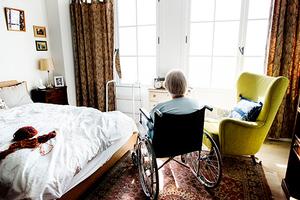Research
Criminal Background Checks Improve Quality of Care in US Nursing Homes

Todd Barket applied for a job as a certified nursing assistant in a Florida nursing home in late 2018 but was arrested when the fingerprints he provided as part of a new background check requirement for nursing home employees linked him to a decades-old murder.
After the fingerprints that Burket provided were processed, they matched that of prints entered as evidence in the killing of a 68-year-old woman in a consignment store in Delray Beach, Florida in 1998. Authorities apprehended Barket at his home and charged him murder and reignited a case that had been cold for many years.
The fingerprints surfaced because Florida is one of 26 states and the District of Columbia that now require applicants for nursing home jobs to undergo a criminal background check. A team of American University School of Public Affairs researchers recently looked at how the quality of care in nursing homes was affected by the new federal regulation.
Distinguished Scholar in Residence Ken Meier, Associate Professor Anna Amirkhanyan, and two doctoral students — Fei Wang and Jourdan Davis — analyzed the impact of the National Background Check Program (NBCP), a federal program authorized by the 2010 Affordable Care Act aimed at strengthening states’ criminal background check efforts and targeting direct patient access employees in long-term care facilities.
“The goal of this policy is to reduce patient neglect, abuse, and misappropriations by encouraging and funding state level efforts to conduct background checks for employees who are involved in direct patient care,” Amirkhanyan said.
While the Florida episode represents an extreme case, this SPA study did show evidence that the more states spend on background checks for front-line workers, the higher the quality of care. The researchers examined records from 16,000 public, nonprofit, and for-profit Medicare and/or Medicaid certified nursing homes. The evidence linking fingerprinting requirements with fewer health deficiencies and with higher “star ratings” of nursing homes was particularly strong.
“The NBCP might influence nursing home quality in numerous ways,” Amirkhanyan said. Current employees might be discouraged from attempting patient neglect and abuse, while prospective employees with criminal records may be discouraged from applying to nursing home jobs. Additionally, the policy may encourage nursing homes to be more vigilant in their human resource practices. “The policy does appear to translate into a more qualified workforce and better outcomes,” she added.
State participation in this regulation is voluntary. To fund the implementation, the federal government provided limited grants to states and new sources of funding soon will be needed to continue to support the program. Amirkhanyan says now that there is research demonstrating that background checks improve services, the hope is that more states will consider adopting the safeguards.
“This is an opportunity for improvement in the quality of care in nursing homes,” said Amirkhanyan. Disabled residents aren’t always in the position to report issues they are having because of physical or mental health limitations. Therefore, she said, it is important to have policies in place to protect vulnerable clients and monitor those with criminal backgrounds working in facilities with access to medications and drugs. The background checks do not always disqualify applicants, but they do help set standards (such as time limits after a conviction) before an applicant can be considered for employment.
“In this era of deregulation, it is important to stress that regulations are adopted for a reason and can benefit the health and well-being of the public,” Ken Meier added. “If the remaining states do not find this research compelling, I hope the federal government does and decides to apply it to all states.”
The SPA researchers have presented their study results at conferences of the Public Management Research Association, the Midwest Political Science Association, and the American Society of Public Administration. The paper is currently under review for publication.
